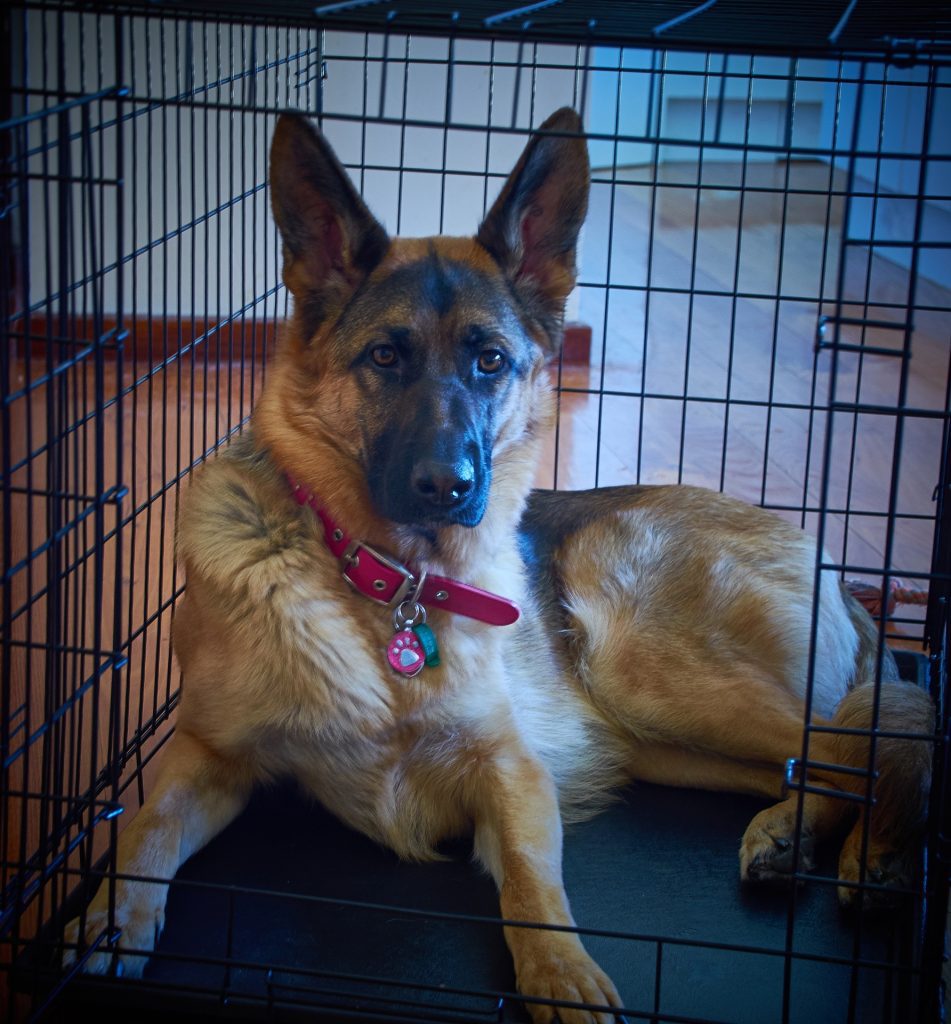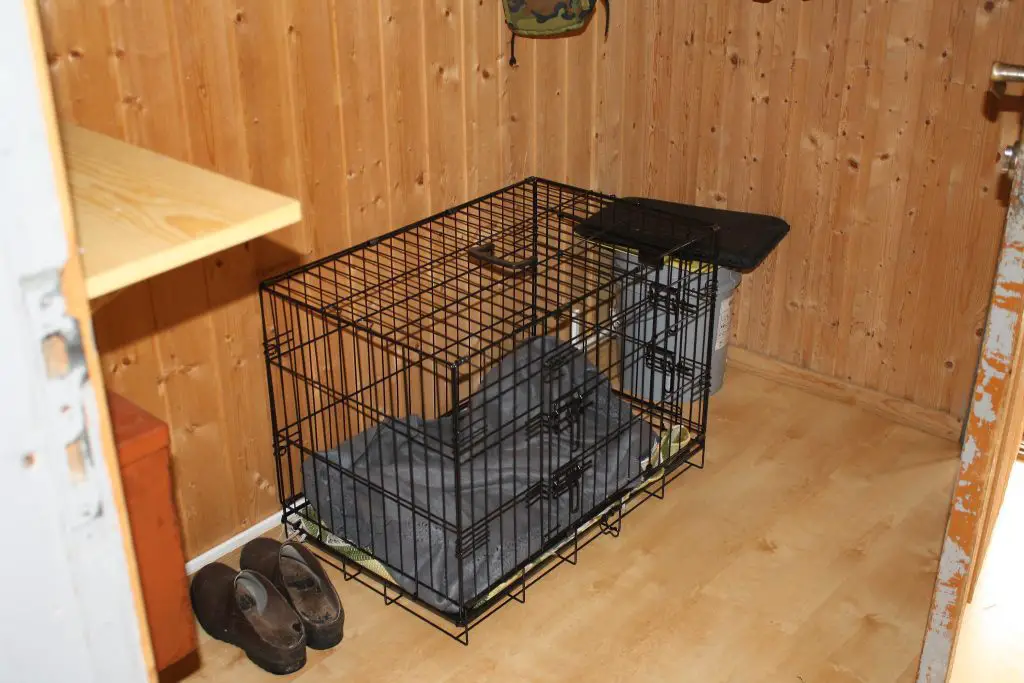When it comes to crate training your German Shepherd, one of the most common questions people have is: “How long can a German Shepherd stay in a crate?” The answer to this question depends on a variety of factors, including your dog’s age, size, and personality.
In this blog post, we will discuss the different guidelines that experts suggest for crate training your German Shepherd. We will also provide tips on how to make the crate training process as smooth as possible for both you and your dog!
Key Takeaway
- German Shepherd puppies can stay in a crate for up to 4 hours depending on their age, while adults can be crated for about 8-10 hours, but it’s generally advised not to crate them for more than 4 hours at a time.
- Crate training is beneficial for German Shepherds as it facilitates potty training, prevents inappropriate behavior, and provides a safe space for them, though it should be used responsibly and not for extended periods.
- For a German Shepherd, you typically need a dog crate that is between 42 to 48 inches depending on the size of your dog, allowing them enough space to stand, turn around, and lie down comfortably.
How Long Can a German Shepherd Stay in a Crate?

German Shepherd puppies under six months old shouldn’t stay in a crate for more than two hours at a time. German Shepherds older than six months can stay in their crates for up to four hours at a time.
However, if you must leave your dog crated for longer periods, make sure he has access to plenty of water and food so he doesn’t get dehydrated or hungry. You should also walk your dog before crating him so he can relieve himself.
The amount of time a German Shepherd will enjoy being in the crate is an individual thing. Some German Shepherds can stay in a crate for hours without any problems. Others may start to get antsy after just a few minutes.
Some dogs love being in a crate and see it as their own personal space while others view it as a prison. The best way to figure out if your German Shepherd likes being in a crate is to try it out and see how it reacts. If they seem stressed or anxious, then the crate probably isn’t the best option for them.
It’s important to remember that crates are not meant to be used as a punishment. They should never be associated with negative experiences.
If you need to leave your German Shepherd in a crate for an extended period of time, make sure to provide them with plenty of toys, food, and water so they can stay occupied and comfortable.
Most importantly, always make sure the crate is big enough for them to stand up, turn around, and lie down comfortably. Otherwise, they may start to feel claustrophobic and anxious.
Is Crate Good For German Shepherds?
Crate training can be beneficial for German Shepherds in many ways, but it’s important to not leave them crated for too long. When used correctly, crates provide German Shepherds with a safe space to call their own.
It can help with potty training and prevent destructive chewing behavior. Crates can also help socialize shy or anxious dogs by providing them with a secure place to observe their surroundings without feeling overwhelmed.
However, German Shepherds should not be left in crates for more than four hours at a time. They are active dogs who need plenty of exercise and stimulation. So, being cooped up in a small space for too long can lead to boredom, anxiety, and other behavioral problems.
German Shepherds may whine or bark if they are not used to being crated. Crating should only be done for short periods of time and should never be used as a punishment. German Shepherds are very intelligent and adaptable dogs, so with proper training, they can learn to love their crate.
If you have a German Shepherd who cries when put in a crate, try using positive reinforcement techniques such as treats or toys to make the experience more enjoyable for them. With patience and consistency, your dog will eventually come to see the crate as a safe and happy place.
If you need to leave your German Shepherd in a crate for longer than four hours, make sure to provide them with plenty of toys and enrichment activities to keep them occupied. And of course, always make sure they have access to food and water. By following these guidelines, you can ensure that crate training is a positive experience for both you and your dog says German Shepherds Forum.
How Big of a Dog Crate Do I Need For a German Shepherd?

Full-grown German Shepherds stand around 29 inches (22 – 26 inches withers height) and weigh anywhere between 55 and 90 pounds. This means that a large dog crate with dimensions of 42 x 28 x 30 inches is needed for your German Shepherd.
However, always get a crate with a divider that you can adjust as your puppy grows, making sure you are not leaving enough place for them to roam around.
There are a few things you’ll need to take into consideration when choosing a crate for your German shepherd. The most important factor is height.
German Shepherds are one of the tallest breeds. So, you’ll want to make sure the crate is tall enough for them to stand up and turn around comfortably. You’ll also want to consider the length and width of the crate.
German Shepherds are relatively long and muscular. So, you’ll want to make sure the crate is big enough for them to lie down comfortably. Finally, you’ll want to consider the weight of your dog. German Shepherds are a large breed. Ideally, you’ll want to make sure the crate can accommodate its weight without collapsing or falling over.
When it comes to choosing a crate for your German shepherd, size is the most important factor. You’ll want to make sure the crate is tall enough for them to stand up and turn around comfortably. The length and width should be sufficient for them to lie down comfortably.
Additionally, you’ll want to ensure that the weight limit of the crate can accommodate your dog’s weight without issue. By taking all of these factors into consideration, you can be sure to choose the perfect crate for your German shepherd. Here are some high-quality crates for German Shepherds on amazon.com.
Where Do You Put a Dog Crate in The House at Night?
If your dog is crate trained and comfortable in its crate, then the best place to keep the crate is in the bedroom. However, if your dog is not used to being in a crate or is anxious in one, then it may be better to keep the crate in another room. Every dog is different, so it’s important to assess what will work best for you and your dog.
There are a few things to consider when deciding where to put your dog crate at night. The most important thing is to make sure that the crate is in a safe place where your dog cannot escape or hurt themselves. You also want to make sure that the crate is not too close to any potential hazards like electrical cords or sharp objects.
Another thing to consider is your dog’s comfort level. If your dog seems uncomfortable in its crate, it might be worth considering moving it to a different location. Some dogs prefer to have their crates in more open areas while others feel more comfortable in smaller, cozier spaces. Experiment until you find what works best for your pup!
Ultimately, the best place for your dog’s crate is wherever they feel most comfortable and safe. By taking some time to consider your dog’s needs, you can ensure that they have a happy and stress-free night!
FAQs
Q: What is crate training for German Shepherds?
A: Crate training is a method used to teach German Shepherds to become comfortable and secure in a crate. It helps with housebreaking, prevents destructive behavior when unsupervised, and provides a safe and cozy space for the dog.
Q: How long should I crate train my German Shepherd puppy?
A: Crate training for German Shepherd puppies should start as soon as they come home. It is a gradual process that can take several weeks to months, depending on the individual dog’s progress and comfort level with the crate.
Q: Can I leave my German Shepherd in a crate all day?
A: No, it is not recommended to leave a German Shepherd in a crate all day. Dogs need exercise, social interaction, mental stimulation, and bathroom breaks. Crating should be balanced with free time outside the crate.
Q: How do I make the crate comfortable for my German Shepherd?
A: To make the crate comfortable for your German Shepherd, you can use a soft bed or blanket, place some toys or chew treats inside, and ensure proper ventilation. The crate should be large enough for the dog to stand, turn around, and lie down comfortably.
Q: Should I leave food and water in the crate for my German Shepherd?
A: It is generally not recommended to leave food and water in the crate for an extended period. However, for puppies or dogs with specific medical needs, small amounts of water and appropriate treats can be provided. Consult with a veterinarian for personalized advice.
Q: Can I use a crate as punishment for my German Shepherd?
A: No, a crate should never be used as a form of punishment for a German Shepherd or any other dog. The crate should always be associated with positive experiences and a safe, comfortable space for the dog.
Q: Are there any risks associated with crate training a German Shepherd?
A: When properly introduced and used, crate training is generally safe for German Shepherds. However, it is important to avoid leaving the dog in the crate for excessive periods, ensuring the crate is of appropriate size, and monitoring any signs of distress or discomfort.
Q: Can crate training help with housebreaking my German Shepherd?
A: Yes, crate training is often an effective method to assist with housebreaking a German Shepherd. Dogs have a natural instinct not to soil their sleeping area, and using a crate can encourage them to hold their bladder and bowels until taken outside.
Q: How can I prevent my German Shepherd from developing crate anxiety?
A: To prevent crate anxiety in a German Shepherd, it is essential to introduce the crate gradually and positively. Use treats, toys, and praise to create a positive association with the crate. Avoid using the crate for extended periods and ensure the dog gets enough exercise and mental stimulation outside the crate.
Conclusion and final thoughts
In conclusion, the key to determining how long a German Shepherd can stay in a crate is to ensure that they are provided with plenty of exercise and mental stimulation.
It’s important to note that German Shepherds have different needs depending on their age, size, and activity level.
Owners should consult a veterinarian or experienced dog behaviorist if they need additional advice when considering crating their German Shepherd.




